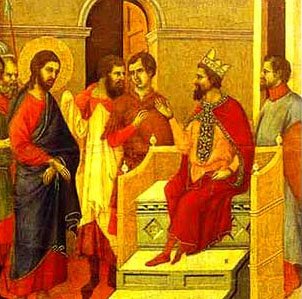Don't Fear the Thief
A guest essay by Pam Fickenscher. Pam is a pastor of Edina Community Lutheran Church in Edina, Minnesota. She blogs about the lectionary, ministry and parenting at http://pastorpam.typepad.com/living_word_by_word/.
For Sunday February 28, 2010
Second Sunday in Lent
Lectionary Readings (Revised Common Lectionary, Year C)
Genesis 15:1–12, 17–18
Psalm 27
Philippians 3:17–4:1
Luke 13:31–35 or Luke 9:28–36
The metaphor of a wilderness journey for Lent has a lot of biblical resonance, of course. From the Israelites' "wilderness school" after slavery in Egypt to Jesus' 40 days before he launches his ministry, the rocky places outside the Holy Land's cities are the thin places where the spiritual realities take concrete form.
But really, almost any wilderness journey will do as a metaphor for why we need Lent. Those of us who take an occasional trip to wild places know that these places can be life-giving, but you wouldn't want to live there. They aren't particularly good places for perfectionists, because no matter how well you pack, once you arrive you nearly always find that you either forgot some essential item — or that you really should have left a few more things behind. As one friend put it this week, "I like the idea of Lent, it's the execution of it that I struggle with." The inability to "do Lent" well can be a great excuse to not enter into the wilderness at all.
 |
True wilderness has to be protected these days. Isle Royale National Park is one such place: an island in the middle of Lake Superior. Its chief treasures are populations of moose and wolves that co-exist in an ever-changing balance. Most of the year, it serves as a research center for biologists, cut off from tourists by ice and snow. In the summer, it takes a plane or a long boat ride to get there. Once there, you must travel by foot or kayak if you want to see more than the very edges of the island. Evidently there are enough campers, however, that the local fox population has gotten very accustomed to human beings and their gear. For anyone who has forgotten all the old folk songs about the fox’s reputation, there are signs around the campgrounds to remind them. One reads, “How far can you hike with one boot?”
The fox doesn’t have the fearsome reputation wolves have in human lore. They are certainly not the scariest creatures you could encounter. But they can put a serious dent in your backpacking plans if you don’t pay attention.
“Go and tell that fox for me, ‘Listen, I am casting out demons and performing cures today and tomorrow, and on the third day I finish my work. Yet today, tomorrow and the next day I must be on my way, because it is impossible for a prophet to be killed outside of Jerusalem.”
 |
I suspect that Jesus knew exactly what he was doing in calling King Herod “that fox.” On the one hand, he was acknowledging the reality that Herod could, with a simple decree, put a halt to Jesus’ ministry. Already he had brought John the Baptist to a quick and ugly end. But calling Herod a “fox” was also placing him in the category of the annoying petty thief — clever and capable, but finally not terrifying.
Jesus is no longer in “preparation” mode. He is headed to Jerusalem — shorthand for a showdown with the powers of evil. And in the mean time, he is preaching, healing, eating with sinners and proclaiming the kingdom of God is at hand. The greatest danger, Jesus knows, is not one that Herod or any other worldly authority would bring, but the danger of being diverted from his mission. That mission is the proclamation that God’s kingdom is at hand, available to all, including those his society has written off: widows, debtors, sinners, tax collectors and little children. His devotion to his mission is in fact a fierce maternal love for those who most need to hear this message. If sticking to his brood, these lost and little ones, makes him more vulnerable to the likes of foxes like Herod, so be it.
 |
It’s a truism now that ours is an age of fear and anxiety. Whether it be terrorism or further economic decline, we are a people who are assaulted daily with the message that everything might fall apart. And in some cases, the messengers are right. As poet Adrienne Rich once wrote in An Atlas of the Diffiicult World, it only takes a bit of ice on a road or a few cells dividing out of control to steal away our loved ones. We have become so accustomed to the daily litany of what might destroy us that we might not even notice the way the headlines seep into our consciousness as we lock our doors, hold our purses closer on the street, and never let our children out of our sight.
We can collect these stories of loss as warning signs, constantly telling us which paths not to go down, until finally we are stuck in our “safe” zones, limiting our activities, our relationships, our sharing of resources with others. We could spend so much time guarding our health, our possessions, our safety that we miss the point of traveling this life at all. But if Jesus’ life is our model, we dare not imagine that the safe path is always the faithful one.
By prayer, fasting and almsgiving, Lent calls us to confront head on those things which stand in the way of our answering God’s call: our greed, our fear, our idolatry of temporary things. The practices of Lent can be reductive — such as a temporary fast from those things that we know can get in the way. Like a good backpacking trip, they teach us that we really do not need that much. But two of the three Lenten disciplines are additive — more time with God, more generosity to our neighbors. No matter how you look at it, attention to these matters is rarely safe for the status quo.
 |
In my own life it has been more useful to collect the stories of those who, against all odds, hike on with one boot. The foxes of this world have stolen away treasure, health, reputation, sometimes even loved ones. They are the couples who — one blind and one lame — still find their way to church together. There are the elderly women who have lost husbands and children, yet still give themselves over to loving new strangers that walk into their lives. There are those who have undergone job loss after job loss, yet still give generously to those who have less. They are people hobbled by mental illness or addiction, who still manage to get out of themselves and truly give to others. They are Christians who have been told by the institution that they are not welcome because of their sexuality or their color, yet have said, in essence, “Lord, to whom shall we go?” There is no doubt that the journeys of these folk are more difficult than mine, but for them following Jesus brings joy despite the risks.
Jesus is so certain of his mission that even kings appear to be no more than foxes — unclean, dog-sized carnivores who cannot have the last word. The last word, he seems to say, will be the accomplishment of his mission, the final evidence that God’s kingdom is at hand, and even death itself will not get in the way of that.
How far can you hike with one boot? All the way to Jerusalem. All the way to the cross, and to the empty tomb.
For further reflection
* What Lenten experiences are "reductive" for you?
* And which ones are "additive?"
Image credits: (1) Terrain.org; (2) National Geographic; (3) DavidWallPhoto.com; and (4) BillPetro.com.





